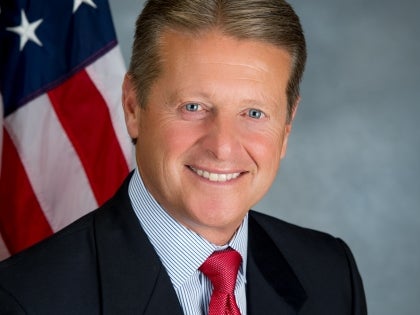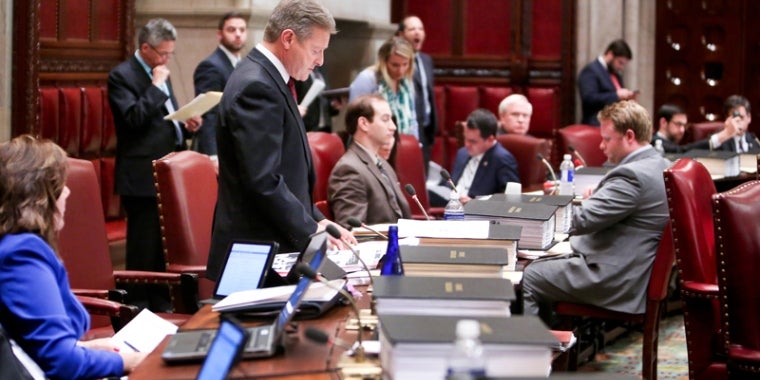
Senator Gallivan Announces Release of Report by Senate's Joint Task Force on Heroin & Opioid Addiction
Jim Ranney
May 24, 2016

Senator Patrick M. Gallivan (R-C-I, Elma) joined his colleagues on the New York State Senate Joint Task Force on Heroin and Opioid Addiction in releasing a report summarizing findings and recommendations resulting from forums held across the state to address New York’s ongoing heroin epidemic. The Task Force announced the report’s findings which include comprehensive legislative recommendations to address shortcomings in the state’s existing opioid prevention and treatment-delivery strategies.
“We have all heard of the devastating impact that heroin and opioid abuse is having in our communities,” Gallivan said. “Based on what we heard from parents, health experts, law enforcement representatives and others across the state, it is clear that it will take a unified effort to overcome this public health crisis. These recommendations help ensure that services and resources are in place to increase public awareness, to help those struggling with addiction and to provide law enforcement with the tools to combat this epidemic.”
In its report, the Task Force identified a four-pronged approach that would stem the growth of the heroin and opioid crisis - prying loose the stranglehold it has on New York’s communities - and supports those battling their addiction on the journey to recovery:
Prevention: increasing awareness to better educate the public of the inherent risks involved in using heroin and prescription opioids, and taking advantage of technological advances available to deter the abuse of prescription drugs and prevent addiction;
Treatment: recognizing the critical need for expanded and improved insurance coverage, and enhancing access to all forms of effective treatment - including inpatient, outpatient, and Medication Assisted Treatment - in order to help individuals return to stable and productive lives;
Recovery: providing the proper supports, such as safe environments, stable employment, and opportunities to participate in diversion programs that avoid incarceration in order to facilitate successful recoveries from addiction; and
Enforcement: implementing criminal justice reforms that give law enforcement the necessary tools to disrupt the supply of heroin and stop the diversion of opiate prescription medications within the state.
LEGISLATIVE RECOMMENDATIONS:
The Task Force incorporated the four essential prongs and collaborated with stakeholders in communities across the state as part of its strategy to develop the report’s legislative and budgetary recommendations. These recommendations create an effective, multi-faceted, and comprehensive approach to addressing many of the issues raised by the state’s opioid crisis.
The Task Force is recommending the following legislative actions for the Senate to consider during the 2016 legislative session and for state agencies to assist in implementing:
Prevention:
· Limiting initial prescriptions of controlled substances (S6091B, Hannon)
· Creating a Prescription Pain Medication Awareness Program (S4348A, Hannon)
· Enhancing patient access to abuse-deterrent technology for opioids (S6962A, Hannon)
· Ensuring proper opioid education to prescribed patients (S7315, Murphy, Amedore, Ortt);
· Establishing a Narcan kit registry (S6516A, Amedore);
· Providing instruction of mental health, alcohol, drug and tobacco use in junior and senior high schools (S5546A, Funke);
· Require counseling prior to issuing a prescription for a schedule II opioid(S7365,Askshar);
· Increasing availability of naloxone (S6346A, Carlucci); and
· Requiring the state Department of Health (DOH) and the state Office of Alcoholism and Substance Abuse Services (OASAS) to examine and report on the underreported and at-risk populations, including but not limited to Native American Tribes and the effect the heroin and opioid crisis is having on those populations.
Treatment:
· Continuing education for credentialed alcoholism and substance abuse counselors (S7301, Amedore, Murphy, Ortt);
· Remove barriers to Medication Assisted Treatment (S7317A, Murphy, Amedore, Ortt)
· Examining insurance coverage for medications approved by the FDA for use in MAT of opioid addiction and examine the accessibility across the state to new treatment modalities;
· Enhancing emergency intervention procedures (S6248B, Ortt);
· Establishing assisted outpatient treatment for substance use disorders (S631, Carlucci);
· Requiring the DOH and OASAS to examine and report on the most effective treatment modalities, including ideal settings, treatment length, and best practices for heroin and opioid addiction;
· Creating and appointing an Ombudsman to assist individuals and families in obtaining appropriate insurance coverage for treatment services;
· Requiring all OASAS-certified treatment providers to inform individuals receiving treatment and their families of their right to file an external appeal with the Department of Financial Services (DFS) and provide them with the means necessary to access such appeal; and
· Requiring DOH and DFS to rigorously scrutinize the implementation of any conditions placed on accessing treatment.
Recovery:
· Including for-profit providers in the Request for Proposals Process for substance use disorder and gambling programs (S7446, Amedore);
· Creating a Sober Living Task Force (S3989A, Croci);
· Expanding treatment options for judicial diversion participants (S6874, Murphy);
· Expanding access to judicial diversion programs (S6322A, Ranzenhofer);
· Encouraging employment of recovering users (S2346, Seward);
· Enacting the Wraparound Services Demonstration Program (S7748A, Carlucci); and
· Requiring DOH and OASAS to examine and report on vital statistics related to heroin and opioid addiction, including relapse rate, length of treatment, and what, if any, follow up care supports are in place upon discharge.
Enforcement:
· Enhancing penalties for the sale of controlled substances on park grounds and playgrounds (S994, Golden) - this bill passed the Senate on March 1, 2016;
· Facilitating the conviction of drug dealers (S100, Boyle);
· Expanding the crime of operating as a major trafficker (S4177, Murphy);
· Creating Drug-Free Zones around drug or alcohol treatment centers and methadone clinics (S7200, Akshar);
· Establishing appropriate penalties as it relates to heroin sales (S7012, Ortt);
· Enhancing judicial access to juvenile records for determining judicial diversion program eligibility (S6317, DeFrancisco);
· Adding fentanyl to the controlled substance schedule (S6632A, Croci);
· Establishing Xylazine as a controlled substance (S7397, Murphy);
· Creating the crime of homicide by sale of an opioid controlled substance (S4163, Amedore); and
· Developing a formula to dispense funds acquired from the seizure of assets used in the commission of drug crimes.
BUDGETARY RECOMMENDATIONS:
The report highlighted this year’s state budget commitment of $166 million for heroin and opioid crisis, treatment, outpatient, and residential services. Due to advocacy by the Senate’s Task Force members, the budget included an increase of $25 million above the Executive Budget’s original proposal.
The report recommends that this additional $25 million would support: Family Support Navigator and Navigator training programs; On-Call Peer programs; Adolescent Clubhouses to provide safe and welcoming spaces for teens; Recovery Community and Outreach Centers; Recovery Coach peer mentoring programs; a “Combat Heroin” Public Service Campaign; Opioid Overdose Prevention program; Opioid Medication Treatment program; Transitional Housing Opportunities; Local Government Unit Block Grants; School Resource Officer Training programs; and a Wraparound Services Demonstration Program.
SENATE’S LEADERSHIP IN ADDRESSING THE OPIOID EPIDEMIC:
The report is just the latest step taken by the Senate Majority Coalition to meet the heroin crisis head on -- seeking legislative solutions and securing necessary funding. Since 2011, laws have been adopted to establish Good Samaritan protections, further expand access to naloxone, create I-STOP, and enhance insurance coverage among others.
In March 2014, the bipartisan New York State Senate Joint Task Force on Heroin and Opioid Addiction was created to examine the alarming rise in use of heroin and opioids that has claimed lives and hurt families across New York State. Following forums held throughout New York State, Task Force members, led by Chair Senator Phil Boyle and Co-Chairs Senator Mike Nozzolio and Senator David Carlucci, secured the enactment of 11 bills signed into law by Governor Cuomo and $2.25 million in substance abuse funding.
Building on this success, Senators Ortt, Amedore, and Murphy were named as the Task Force Co-Chairs early last year and joined with Task Force members to hold forums in Westchester, Monroe, Niagara, Albany, Otsego, Yates, Kings, Suffolk, and Broome counties. They brought together medical experts, treatment providers, law enforcement, and affected New Yorkers who provided invaluable insights and anecdotal evidence, affording the members the opportunity to understand how legislation could better address this public health crisis.
Members of the bipartisan task force include Senators Fred Akshar (R-C-I, Colesville), John Bonacic (R-C-I, Mount Hope), Phil Boyle (R-C-I, Suffolk County), David Carlucci (D, Rockland), Thomas Croci (R, Sayville), Hugh Farley (R-C, Schenectady), John Flanagan (R-C-I, East Northport), Rich Funke (R-C-I, Fairport), Pat Gallivan (R-C-I, Elma), Martin J. Golden (R-C-I, Brooklyn), Joseph A. Griffo (R, Rome), Kemp Hannon (R, Nassau), Andrew Lanza (R-C-I, Staten Island), William Larkin (R-C, Cornwall-on-Hudson), Kenneth LaValle (R-C-I, Port Jefferson), Carl L. Marcellino (R, Syosset), Kathleen A. Marchione (R-C, Halfmoon), Jack Martins (R-C-I, Mineola), Michael Nozzolio (R-C, Fayette), Tom O’Mara (R-C, Big Flats), Michael Ranzenhofer (R-C-I, Amherst), Patty Ritchie (R-C, Heuvelton), Joseph Robach (R-C-I, Rochester), Diane Savino (D, Staten Island/Brooklyn), Susan Serino (R, Hyde Park), James L. Seward (R-C-I, Oneonta), David J. Valesky (D-Oneida), Michael Venditto (R-C-I, Massapequa), and Catharine Young (R-I-C, Olean).
The full report with detailed findings and recommendations can be found at:
https://www.nysenate.gov/sites/default/files/articles/attachments/htf_report_final2.pdf
-30-



